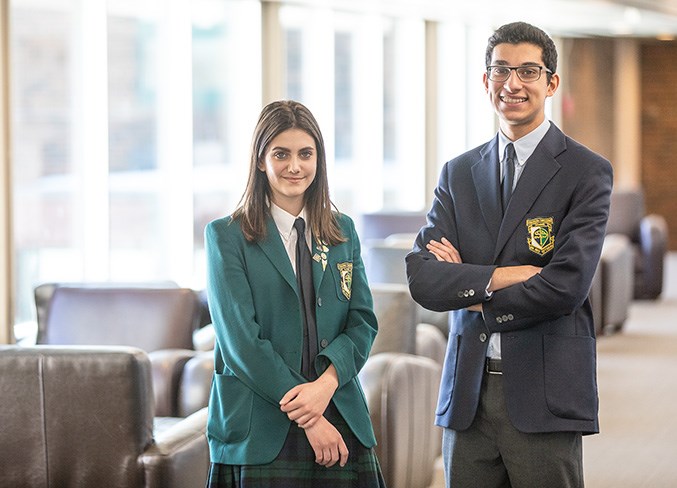Public speaking can be the stuff of nightmares for a lot of people, but that isn’t the case for two of Strathcona-Tweedsmuir School’s finest.
Chelli Shapiro and Zaki Lakhani returned from England after representing the Canadian Delegation at Oxford Finals Day.
Finishing 22nd out of 116 teams, the two are more than happy with their experience.
“We were happy with the results, we were still in the top-end for all of our rounds,” said Lakhani. “Above all, it was just a great learning experience and of course being in sort of the top tier is just something that we’re really happy with.
“Just being there, in a place that has so much history in terms of debate, was just fantastic and almost surreal to be in this room where some of the greatest world leaders have debated or spoken.”
Competition was a full-day event and consisted of four rounds for every debater, and two rounds of semifinals and finals.
While Shapiro and Lakhani didn’t make it to the final rounds, they did place second in all of their rounds.
Shapiro was ranked one of the top 40 debaters out of 230, while Lakhani was ranked in top 50.
The competition marked the end of the debate season for the two, but neither of them are done debating.
For Lakhani, his debate career will continue in Grade 12 next year, but Shapiro is taking her skills to university, studying political science.
“Definitely discussing things in a debate like populism and nationalism, those are issues I speak a lot to, but maybe I have a lot to learn about,” said Shapiro.
“So having the opportunity to study political science I think is going to help me grow my base of knowledge and hopefully apply it to university debate circuits.”
The topics the two faced at the competition were diverse and required a breadth of knowledge the two could draw on for a variety of different circumstances.
For example, they said a topic of debate was the legalization of the sale of human organs.
“We’re really lucky, we have a fantastic debate coach who has taught us to pull the major themes out of a debate topic and then go from there,” said Shapiro.
“So when you get a really broad topic about the sale of human organs, you’re also talking about personhood. What is individuality? What autonomy do you have over your own being?”
Lakhani said through their practice they deconstruct the issue, because there is always some kind of universal theme to be taken from it.
“The other thing is that it’s good to be in a team, because each of us have different strengths in different areas and different knowledge bases,” he said.
After a whirlwind trip to England, the two have had to readjust to the pace of school since their return.
“You get such an adrenaline high when you’re debating because it is so intense and you have to constantly stay alert and make arguments and listen to what people are saying so you can respond adequately, so when you come back and everything is sort of going at that normal pace that you’re used to, it’s sort of a shock,” said Shapiro.
“You have to take a step back and calm yourself down and make sure you’re going at the same tempo as everyone else.”
Bringing the experience home with them, the pair hope Lakhani will be able to provide an example of the European debating style in the next debate season, but mostly reflect on the experience for what it brought them.
“Seeing all these debates happen, it just reminds me that at the end of the day, it’s play for us. It’s fun. It’s not always serious analysis and destruction of the other team’s arguments, but it’s something that genuinely gives us a lot of satisfaction,” said Lakhani.
“I think that as sort of tomorrow’s leaders, it’s very important to emphasize debate to all generations just because it’s what drives global discourse and the decision making process.
“I think that if we have more informed individuals who like debating, who like looking at issues from both sides, who like critical thinking and argumentation, that we’re going to shape better leaders.”



